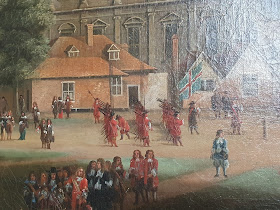 |
| Crossing of the Düna 1701 by Daniel Stawert |
Wednesday, 30 April 2025
Siege of Schenkenschans 1636
 |
| Siege of Schenkenschans by Gerrit van Santen. |
The siege of Schenkenschans (30 July 1635 – 30 April 1636) was a major siege of the Eighty Years' War. In a successful campaign the Army of Flanders, commanded by Spanish general Cardinal-Infante Ferdinand of Austria, captured Schenkenschans along with a number of important towns, reversing recent Dutch gains and opening the Dutch Republic to a possible invasion. The Dutch Stadtholder, Fredrick Henry, pushed the republic's military efforts to their limit to recapture the fortress of Schenkenschans to counter the threat to the exposed Dutch heartland. He succeeded in doing so after a costly nine month siege.
Tuesday, 29 April 2025
England Be Glad! St. George's Canzona FULL ALBUM (1972)
England Be Glad! St. George's Canzona
I have this album on vinyl - it's good.
| A1 | The Agincourt Song | |
| A2 | Ductia | |
| A3 | Tuba Gallicalis | |
| A4 | Enforce We Us | |
| A5 | L'Homme Arme | |
| A6 | The Best Rede | |
| A7 | Man Mei Longe | |
| A8 | Ductia | |
| A9 | Ja Nuns Hons Pris (Sad Is Each Captive's Story) | |
| A10 | The English Estampie | |
| A11 | Anglia Tibi Turbidas | |
| B1 | The Battle Pavan & Galliard | |
| B2 | O Mistress Mine! | |
| B3 | The English Nightingale | |
| B4 | England Be Glad! | |
| B5 | Greensleeves (To The Romanesca Ground) | |
| B6 | I Am A Jolly Foster | |
| B7 | Prince Rupert's March | |
| B8 | The National Anthem |
Cowdray engravings
HereThe Cowdray engravings comprise five 18th-century engravings of 16th-century wall-paintings, originally commissioned by Sir Anthony Browne. The original paintings were destroyed by fire in 1793.
Monday, 28 April 2025
Holcroft Blood's Ordnance
Ran by the late Roger Emmerson this group were a mainstay of the 300th anniversary events and they travelled about extensively. Much missed.
 |
Saxon artillery display Festung Königstein
Kurfürstlich Sächsische Kanoniere 1730 in Aktion! Erlebt Kanoniere in historischen Uniformen beim Salutschießen! Auf ins 18. Jahrhundert und spürt die geballte Kraft und Präzision der damaligen Waffentechnik.
Sunday, 27 April 2025
Halte des Gardes Françoises, 1736
Jacques Philippe Le Bas (1707-1783), d'après Charles Parrocel (1688-1752), Halte des Gardes Françoises, 1736Bibliothèque nationale de France,
Saturday, 26 April 2025
Marche militaire de l'ancien Régime - Marche du régiment de Champagne, les gris vêtus".
Get in touch with the regiment recreated here
Pour cet très ancien régiment dont l'origine remonte à 1558, il est attestée que lors de son entrée au Quesnoy en 1712 avec Villars, on jouait Auprès de ma blonde.
For this very old regiment whose origin dates back to 1558, it is attested that upon its entry into Quesnoy in 1712 with Villars, they played Auprès de ma blonde.
Friday, 25 April 2025
Thursday, 24 April 2025
Wednesday, 23 April 2025
Monday, 21 April 2025
Saturday, 19 April 2025
Thanks to Adrian Clements for this
A feature on the Norton St. Philip battle, in the Spring edition of the Battlefield Trust's quarterly 'Battlefield ' magazine. Here
Friday, 18 April 2025
Khurasan News
Khurasan Miniatures is in the process of expanding our later 17th century range in 15mm to the very end of the period, so covering the War of the Grand Alliance, and the Boyne campaign.
Here are some generic musketeers in informal tricornes with flintlocks. We’ll be releasing these when we have some command and cavalry with updated dress as well. Stay tuned!
Wednesday, 16 April 2025
Cromwell's Ironsides
Thanks to Stephen Tindle for this. From the December '84 and January '85 issues of Military Modelling comes these two articles about Cromwell's Ironsides by Allan Buttery and illustrated by Richard Scollins.
GNW Kickstarter
New Flags of War Jacobites
A great range. Love those cavalry. www.flagsofwar.com. I believe there are more (personalities and Cavalry command) not photographed yet.
"Culloden" (1964) Scottish Jacobite Rebellion Classic Docu-Drama
, Peter Watkins’ first full-length film, a docudrama made for the BBC, portrays the important Battle of Culloden which in the words of the narrator “tore apart forever the clan system of the Scottish Highlands”. The film was hailed as a breakthrough for its cinematography, as well as its use of non-professional actors and presentation of an historical event in the style of modern TV reporting. Watkins is known for pushing boundaries to the extreme with his documentaries and his films continue to inspire today.
Sunday, 13 April 2025
Gathering of French 18thc reenactors
Exercice de troupes dites réglés suivant le règlement modifié de 1746



.jfif)










.jfif)























